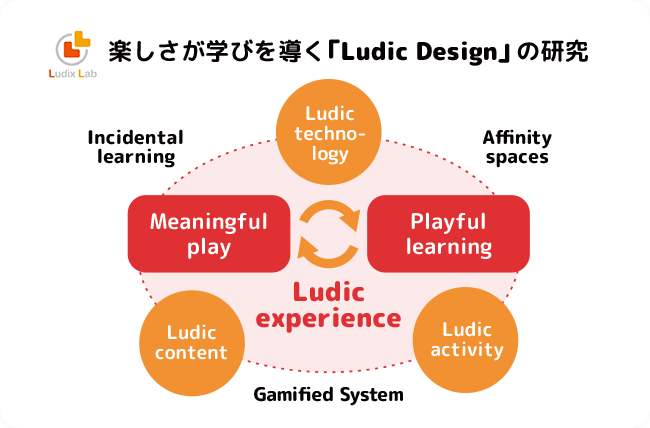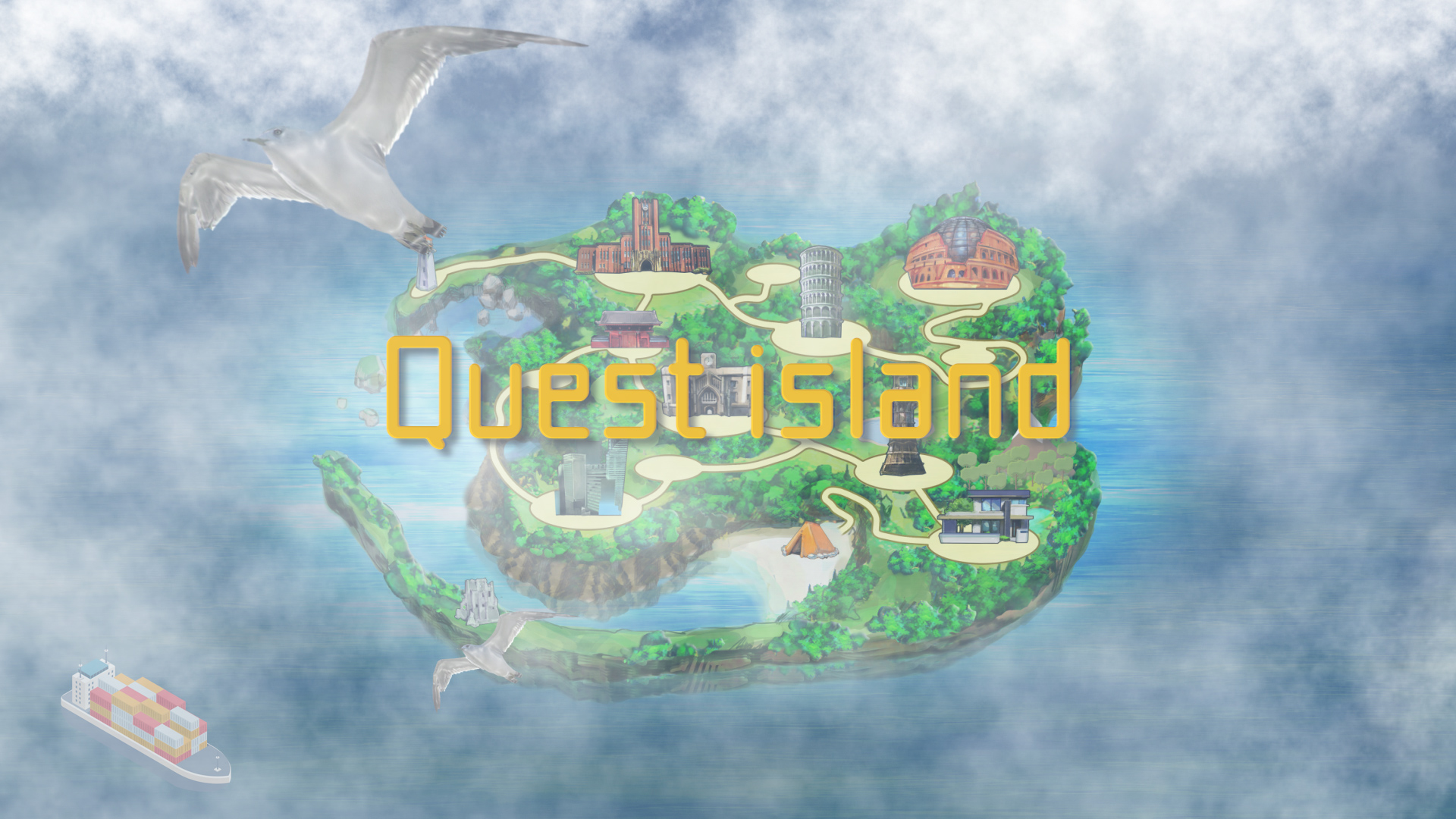-
 Ludix Lab @ UTokyo
Ludix Lab @ UTokyo
-
東京大学 大学院情報学環 藤本研究室
-

-

-

-
日本語 ENGLISH
Monthly archive: January 2023
Our Lab
post date and time: 2023-01-13 contributor: admin
At Ludix Lab, we are deeply committed to developing “Ludic Experiences” that foster genuine human learning and growth. Grounded in the fundamentals of educational technology and instructional systems design theory, Our research thoroughly explores the field of game-based learning methodologies. We work collaboratively to create effective design techniques, explore supportive strategies for online education, and produce learning content that thoughtfully incorporates elements of game-based learning.Our aim is to enrich and enhance the educational journey for learners everywhere.

Educational institutions today offers a full range of options and learning opportunities. However, learning is different for each individual, as each has different aptitude and motivations toward learning. Traditional teaching methods are not effective for everyone.
Our laboratory’s mission is to foster a society where everyone can enhance their lives through meaningful learning experiences. We strive to create diverse learning opportunities, make conventional educational settings more engaging, promote learning outside traditional environments, and develop and implement teaching methodologies that address emerging societal needs. Our core research theme is: ‘Developing a New Learning Environment for the Future’.”
Research Themes:
Currently, we are developing research projects mainly on the following research themes.
- Game learning methodology
Exploration of design methodologies that integrate “meaningful play” with “engaging learning.” This includes studies on gamification design methods within education, the creation of educational curricula incorporate game elements, and the development of tools to aid in the adoption of game-based learning. Development of educational programs for schools that harness gamification methods.
Examples of research results:
Fujimoto, T. (2015) Development and practice of a lesson design framework incorporating game elements. Transactions of the Japan Society for Educational Technology. Journal of Japan Society for Educational Technology. 38(4) 351-361.
Fujimoto, T. and Yamada, M. (2013) Current status and future development of evaluation on educational use of games in informal learning, Transactions of the Japan Society for Educational Technology. Journal of Japan Society for Educational Technology. 37(3). 343-351. Fujimoto, T. (2012) An introduction to game developer education using serious game development as a subject, Journal of Digital Game Studies, 5(2). pp. 53-58. 53-58.
- Game learning contents and technologies
Design and creation of instructional materials and learning systems tailored for game-based learning methods. Production of various game-based learning materials, such as digital game applications for mastering subjects like English and math, as well as card games designed for career education.
Examples of research results:
Fujimoto, T., Fukuyama, Y., Azami, S. and Konno, S. (2017) JobStar Online: Game-Based Learning on Smartphones to Promote Youth Career Education. International Conference on Computers in Education (ICCE 2017), Christchurch, New Zealand. 765-773.
Fujimoto, T., Kishimoto, Y., Nishimura, K., Takahashi, K., Takahashi, J., Taniuchi, M., Yamauchi, Y. (2015) Game Developer Education Practice Using Learning Game Development Platform, Journal of Digital Game Studies, 7(2). 13-21.
Fujimoto, T., Misono, T., Takahashi, K., Otuji, Y., Suzuki, H., and Yamauchi, Y. (2012) Designing a Game-based Social Application for Mathematics Proceedings of Meaningful Play 2012. East Lancing, MI, USA.
- Learning Support Methods in Online Education
Research focused on the creation of learning content, pedagogical techniques, course design, and support structures for online learning communities, notably in platforms like massive open online courses (MOOCs).
Examples of research achievements:
Fujimoto, T., Takahama, A., Ara, Y., Isshiki, Y., Nakaya, K., and Yamauchi, Y. (2018). Designing a MOOC as an Online Community to Encourage International Students to Study Abroad. educational Media International. 55(4). 333-346. doi: 10.1080/09523987.2018.1547545
Fujimoto T, Ara Y, Yamauchi Y (2018) Trends in Learning Analytics Research in Massive Open Online Courses (MOOCs). Journal of Japan Society for Educational Technology. 41(3), 305-313.
- incidental and contingent learning in play
Analysis of learning experiences derived from entertainment activities. This encompasses studies on learning within online game player communities and in “affinity spaces” – venues where activities are shaped by a shared enthusiasm for games.
Examples of research results:
Fujimoto, T., and Yap, C. M. (2016). The Analysis of Incidental Learning in the Affinity Spaces of a Smartphone Game “Neko Atsume”. In the proceedings of the International Symposium on Emerging Technologies for Education (Roma, Italy), Springer, Cham. 3-13. https://doi.org/10. 1007/978-3-319-52836-6_1
Fujimoto, T. (2005). Social Interactions Experienced in the Massively Multiplayer Online Game Environment: Implications in the Design of Online Learning Courses. Presented at the AECT annual conference. Orlando, FL.
超高齢社会体験ゲーム「コミュニティコーピング」のゲーム体験会を開催します
post date and time: 2021-05-27 contributor: admin
ゲーム体験会は東京大学大学院学際情報学府 藤本研究室
(担当責任者 石田好一)の研究の一環として開催されます
みなさんも、超高齢社会をゲームで体験してみませんか?
「コミュニティコーピング」の概要
・超高齢化社会の重要な課題の一つである社会的孤立の解決を目的に、一般社団法人コレカラ・サポートにより開発されたゲームです
・コミュニティの人と地域資源をつなげることで社会的孤立を解決する課題解決型シミュレーションゲームです
・高齢化にともない発生する孤立者の悩みに対して、表面的にはわからない本当の悩みを明らかにし、専門家や地域のつながりによる解決を目指します
・プレイヤー全員で力を合わせて地域社会の崩壊を防ぎ、持続可能なコミュニティの創生を目指します
・「コミュニティコーピング」の詳細については、下記のサイトからご覧になれます
https://comcop.jp/
実施要領
① 日 時:2021年6月27日(日)19:00-21:30終了予定
(終了が30分程度、遅れる可能性もありますことをご了承ください)
② 参加費:無料
③ 主 催:東京大学大学院 学際情報学府 藤本研究室 担当責任者 石田好一
④ 実施方法:Zoomによるオンラインワークショップとして実施
ご参加の際は、PCのほかに、スマートフォンも利用しますので、お手元にご用意ください
また、ユドナリウムというツールを使用しますが、次のブラウザが対応可能ですので、ご準備をお願いします(Google Chrome、firefox、Safari、Microsoft Edge)
⑤ 所要時間:ゲームプレイ後の振り返りと、事後アンケート用紙への回答を含めて2時間30分から3時間程度を予定しています
⑥ 募集人数:16名
応募者多数の場合は、ご参加いただけない場合がありますので、ご了承ください
参加者のみなさまに対してのみ、体験会の1週間前を目途に、ご連絡をさせていただきます
その際、体験会のZoomのURLと事前アンケートを送付させていただきますので、アンケートへのご回答の協力をお願いします
⑦ 参加条件:多数の参加申し込みが予想されるため、参加が確定された方は、当日は欠席せずに参加できる見込みであること
⑧ 参加申込方法:参加ご希望の方は、下記のサイトからお申し込みください
参加申し込み
「コミュニティコーピング体験会」参加申し込みフォーム (google.com)
連絡先
「コミュニティコーピング体験会」 担当責任者
東京大学大学院 学際情報学府 石田好一
連絡先:東京大学大学院情報学府 藤本研究室
Mail: ishida-koichi4201@g.ecc.u-tokyo.ac.jp
藤本研究室での研究指導をご希望の方へ
post date and time: 2019-06-04 contributor: admin
藤本が兼担教員として所属する東京大学大学院 学際情報学府文人コースの入試説明会が今週土曜に開催されます。開催日が近付いてきましたのでお知らせします。
来年度入学生より、私の研究室で大学院生を毎年2名程度受け入れて研究指導できますので、大学院進学にご関心のある方は入試説明会にご参加ください(大学院生として私の研究指導を受けるためには、まず大学院入試を通過する必要があります)。
この日は午前中に文人コースの入試説明会があり、午後に学府全体の入試説明会があります。午前の説明会後の懇談の時間と、午後の各研究室ブース展示と研究紹介コーナーの時間に教員と個別にお話しできる時間が設定されていますので、お越し頂ければ研究テーマなどの個別の質問にお応えできます。
東京大学大学院 学際情報学府・文人コース入試説明会
文人コース(文化・人間情報学コース)夏季入試説明会
日時:2019年6月8日(土)10:00-12:00
場所:東京大学本郷キャンパス・情報学環福武ホール地下2階ラーニングシアター
http://bit.ly/2KqNRmD
学際情報学府入試説明会
日時:2019年6月8日(土)13:30-16:30
場所:東京大学本郷キャンパス・情報学環福武ホール地下2階ラーニングシアター
http://bit.ly/2WnCi6Y
藤本 徹の教員プロフィール
http://www.iii.u-tokyo.ac.jp/faculty/fujimoto_toru
オンラインコース「教育のゲーミフィケーション」受講者募集のお知らせ
post date and time: 2019-04-18 contributor: admin

昨年度から時間をかけて準備していた公開オンラインコース「教育のゲーミフィケーション:プレイフル/ゲームフルな学習デザイン方法論」の受講者募集を開始しました。
このコースでは、教育にゲーミフィケーションを取り入れるためのゲームデザインの概要や事例を学び、ゲームを教育に取り入れる方法や、実際にゲーム教材やゲーム要素を取り入れた学習活動の計画を立てるための基本的な知識を身に付けることができます。
毎回の講義ビデオの視聴と、教育現場のさまざまな問題状況でゲーミフィケーションデザインのクエスト課題に取り組む内容で、実践的な知識を学べるように構成しています。修了基準をクリアした方へコース修了証を発行します。
あまり勉強っぽくなく楽しんで学べるように、通常のMOOCとは異なる仕掛けを用意しました。このテーマに関心のある方は経験の有無に関わらず、どなたでも無料で受講できます。受講ご希望の方は、下記の受講登録フォームからお申し込みください。
【↓受講登録はこちらのフォームから↓】
https://forms.gle/eoSiDF9vyd8J6kX57
このコースで学べること:
このコースを受講することで、次のようなことを学べます。
* 教育技法や学習理論についての基礎的な知識
* 学びの場のデザイン方法についての基礎的な知識
* ゲームやゲームデザインについての基礎的な知識
* ゲームと学びの接点に目を向ける考え方
* 教育分野のゲーミフィケーションの事例やデザイン方法
* 教育分野のゲーミフィケーションの実践方法
コースアウトライン:
レベル1:ゲームと学びの接点に目を向ける
レベル2:教室のゲーミフィケーション
レベル3:学校のゲーミフィケーション
レベル4:ファイナルチャレンジ(総合演習)
受講に要する時間:
標準的な学習時間として週2-3時間を想定していますが、経験や知識の差によって必要時間は異なるところがあります。
受講に必要な環境:
このコースは、MOOCプラットフォームのedX edge(エデックス・エッジ)で配信します。ネットに繋がったパソコンまたはスマートフォンのブラウザ環境があれば受講できます。
開講期間:2019年5月10日から開講(全4回)
受講登録締切:5月7日(火) ※受講方法の詳細は、登録締切後にご連絡します。
主な対象者(受講をお勧めしたい方):
ゲームやゲーミフィケーションの手法を導入したい教育者、教材開発者、教育の場でゲームデザインの経験を生かしたいゲーム開発者。教育経験やゲーム開発経験があると理解が進みますが、前提知識がなくても受講できます。
受講料:無料です!
受講方法:
東京大学が提供するコースページ上で学習します(受講方法の詳細は、コースページ公開後にご登録頂いたメールアドレスにお送りします)。
講師:藤本 徹(東京大学 大学総合教育研究センター 講師)
このコースについて:
このコースは、東京大学の研究者グループ(研究プロジェクト責任者:藤本 徹)がオンラインコースの学習効果に関する研究のために提供するものです(2017年度JSPS 科研費17H00824(研究代表者:山内祐平)、2018年度JSPS科研費18K02855(研究代表者:藤本徹)の助成を受けて実施しています)。 授業で収集された学習履歴データは、個人情報が特定されない形で慎重に取り扱い、論文や研究発表などのための研究用途で統計的に処理して使用します。授業への参加は研究データの提供に同意されたこととして取り扱います。